How Much Does An HVAC System Installation Cost?

With a reliable HVAC system in place, you are assured of comfort and safety at home. Additionally, a good HVAC system will help you avoid the cost of premature repairs, high energy consumption, insurance, and even medical treatments. As long as your HVAC system is performing well, you and other members of your household have a lower risk of suffering from illnesses such as heat stroke, heat exhaustion, pneumonia, respiratory diseases, and a host of other medical issues. A reliable HVAC system can regulate indoor temperatures and prevent pipes from freezing and bursting, hence ensuring that you never have to worry about water damage. However, different systems come with different price tags. In this article, we discuss factors that influence an HVAC installation cost. Likewise, we share heating and cooling installation costs for the Poconos and the Lehigh Valley area.
How Much Are HVAC Installation Costs?
Contents
The cost of an HVAC system installation will vary widely, depending on certain factors. If you want a ducted system, you will require a network of ducts installed, which means you will have to spend more for installation if you do not have a ductwork system yet. However, if you choose a ductless system, you can avoid the need for a ducted network to be built into your home. As such, you pay less for installation. However, ductless systems do cost more to buy.
Factors That Affect HVAC Installation
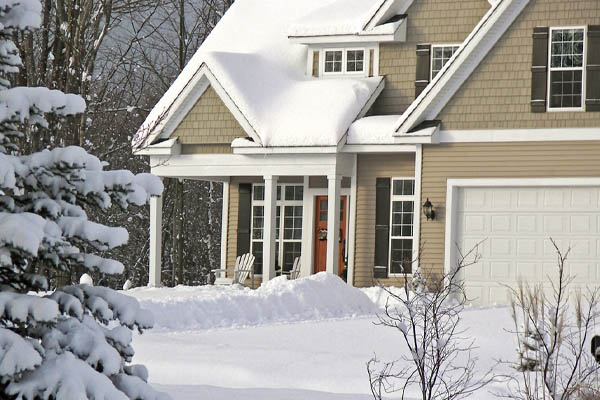
In general, the cost of an HVAC system installation in northeastern PA will depend on a combination of factors that are related to the process itself. Some of these factors include:
- the type of heating and cooling system to be installed
- the size of the house
- the number of zones in the house
- the complexity of the process of installation
- the capacity of the HVAC system
- HVAC efficiency rating
- accessories (if necessary or desired)
Most HVAC contractors will charge the installation cost by square footage, which means that if you have a bigger house, it will naturally cost more. If you want to use HVAC zoning in your home, the contractor might have to install additional duct dampers to redirect heated or cooled air to different areas of the home. Another key factor is the AFUE rating and the SEER rating of the system. The higher the efficiency rating, the higher its cost in terms of purchase. So if you have an air conditioner with a SEER rating between 13 and 28, expect the cost to increase with its efficiency rating as reported by AHRI. If you wish to install other HVAC accessories such as indoor air purifiers, dehumidification systems, whole-house humidifiers, and UV lights, it will also cost more.
How Much is the Average Cost of Heating System Installation?
Below you will find a detailed discussion on the costs of installing different heating systems in Pennsylvania.
What Is The Cost Of Installing A New Boiler?
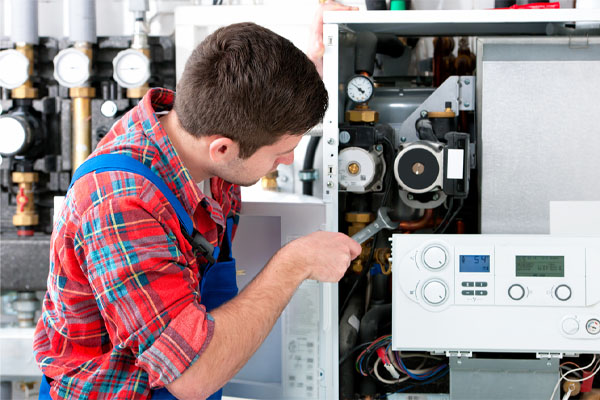
An estimated 9 million American households use boiler units to heat their homes. A key advantage of boilers is their reliability and capacity to generate stable heat to keep you comfortable. However, this also depends on the efficiency rating of the system. To install a boiler in your home, you will have to consider the size of the structure it will heat up because this also affects the cost. In Pennsylvania, you can expect the cost of boiler installation to range between $9,800.00 to $26,000.00. This, of course, will depend on which HVAC contractor you work with and your home heating needs.
Factors That Affect the Cost of Boiler Installation
If you want to install a boiler, keep in mind that there are factors that will affect the cost. These include:
- Boiler Size – If you have a bigger home, you will need a larger boiler to heat it efficiently. The installation cost associated with bigger boilers is also higher compared to that of smaller units. Larger units require more in terms of infrastructure and labor, both of which add up. Note that an oversized boiler is not a good solution if you want more heat. It will simply cause discomfort and increase the cost of heating unnecessarily. If you want the perfect size, talk to a qualified and experienced HVAC contractor to help you determine the boiler unit with the right BTU for you.
- Location Of Your Home – The prevailing climate of the region where you live is an important factor to consider when installing a boiler. This is the reason why the cost of installation varies depending on location. This is also why the cost is different from one state to the next.
- Type of Boiler – There are different types of boilers you can consider, including conventional boilers, system boilers, and combination units. In general, combi boilers tend to cost less compared to conventional boilers. They also come in different efficiency ratings.
- Boiler Fuel Type – The cost of fuel to run the system should be an important consideration. Boiler units may use gas, electricity, or fuel oil. Keep in mind that the cost of each of these types of fuels fluctuates depending on the season and certain market forces. Choose the one which is most effective and cost-efficient for you.
- Special Features – If you want to transition from one type of boiler/fuel to another, ask your HVAC contractor to perform some upgrades and modifications during installations. It is likely you will need other features such as tanks, valves, ductwork, and electric cables, depending on which type of boiler is going to be installed.
How Much Does It Cost For A Furnace Installation?
On average, the cost of getting a furnace installed in Pennsylvania will range from $7,200.00 to $16,000.00. Keep in mind that these figures will vary, depending on the HVAC contractor you will be working with, as well as on the size of your home.
Factors That Affect the Cost of Furnace Installation

There are several factors that you should consider during a furnace installation. These include:
- Complexity of the Furnace Installation – In general, your HVAC contractor could spend from 4 to 8 hours to have the furnace installed in your home. However, if there are other aspects to consider that could complicate the process, it might take longer. These include factors such as gas lines, modifications to electrical wiring, and HVAC ductwork. Your HVAC contractor will charge more if the installation requires more work or has a higher level of difficulty.
- Furnace Energy Source – The cost of installation can also be influenced by the specific type of fuel that the furnace system will use. For example, an electrical furnace is generally cheaper to install but expect the long-term cost of energy consumption to be high. A gas furnace is also generally cheaper than an oil furnace. However, heating oil fuel can generally produce more heat compared to natural gas, which means that a heating oil furnace will cost less to operate over the long term.
- Furnace Size – The cost of a furnace installation will increase as the size of the unit increases. Ask your HVAC contractor to do an HVAC load calculation or Manual J on your home. This will help calculate the true furnace size you will need. If you have an undersized furnace installed, it will not be able to heat your home sufficiently while an oversized furnace will not only significantly lower natural humidity indoors but also increase the cost of heating.
- Furnace Efficiency – A high-efficiency furnace is, in most cases, more expensive. However, they are better at lowering your energy costs long-term. A knowledgeable HVAC contractor can guide you on choosing the best furnace for your home, one that has a good AFUE rating, using the area of your home and your heating needs as references.
What is the Cost of Central Air Conditioning Installation in PA?
Let’s take a closer look at the average cost of having specific types of cooling systems installed in Pennsylvania.
Air Conditioner Installed in a House With a Pre-Existing Furnace and Ductwork
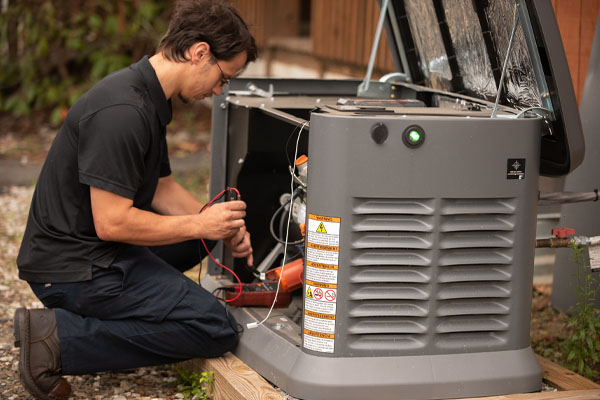
If your home already has a furnace and ductwork system in place, you likely will have to pay a lower cost for installation. Since these structures are already in place, the installation process will be quicker and much easier for the HVAC contractor.
However, you should also consider the current condition of the furnace and the ductwork, especially if you are having a forced-air AC system installed. Old, worn-out ductwork will either have to be replaced or refurbished to ensure that your central air conditioner will work well.
If you have an older or used furnace, it may also have to be serviced to ensure that it is in excellent working condition. Otherwise, you will save more on installation costs if you have a perfectly working pre-existing system. For a replacement air conditioner system, the costs range from $11,000.00 to $20,000.00.
What Factors Affect the Cost of Central Air Conditioner Installation?
- Type of AC System – AC systems are available in different sizes, functionalities, and shapes. There are AC systems that offer single-speed air conditioning and other systems that have variable speeds. Which system you choose will affect how much you will pay for installation.
- AC Size – Larger AC systems are generally more expensive because they can supply cooled air to a wider area.
- AC Efficiency – AC systems with higher SEER rating cost more to install. However, they do save you more in energy costs over the long term, thanks to their high efficiency.
- HVAC Installation Rates and Labor Costs – HVAC contractors do charge different rates for the installation, although this will generally depend on the air conditioner size and the complexities of installation involved. If you want a more reasonable cost of installation that is performed professionally, contact R.F. Ohl.
- HVAC Ductwork Condition – Getting a central AC unit installed in a home that has existing ductwork will cost less if your ductwork is in good working condition. Now, if the HVAC contractor has to build ductwork for your home, expect to pay more on installation costs.
- Additional HVAC Equipment – Additional accessories add up the cost of installation. For example, if you want an air purifier or a whole-house dehumidifier installed with your central AC system, expect to pay more. It will also cost more to install a system to cool more HVAC zones. HVAC zones are necessary if you want to have better control over the temperatures in different areas of your home. It is likely that dampers will have to be installed, based on the number of HVAC zones you want to create. As the number of dampers increase, so will the cost of installation.
Getting a Central AC Installed in a Boiler-Heated Home
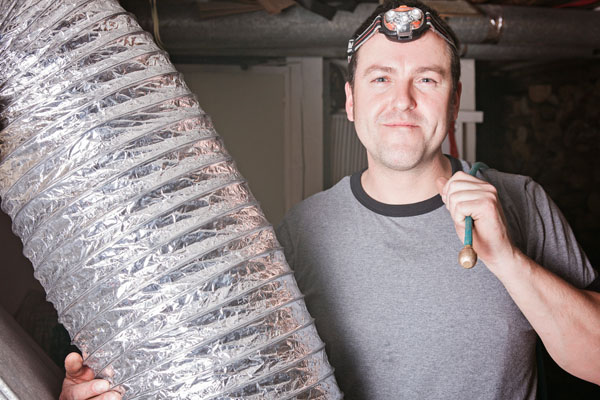
If your home already has a boiler in place and you want to have central air conditioning installed but do not have ductwork, expect the cost of installation to be between $17,000.00 to $28,000.00. This amount is generally higher compared to what you can expect to pay if you already have a ductwork system in place. In most homes, the HVAC team will build the system of ducts from scratch. Building the ductwork could also mean having to tear down and rebuild ceilings and walls to do the job.
Things are more complicated if your home design and layout cannot make room for a network of ducts. Older homes, for example, have plaster walls, which means having ductwork installed can be very challenging. Now let’s say that the HVAC contractor was able to install the ducts on an older home. The next challenge is ensuring that the structural integrity of the building is not compromised. If this is a major concern, consider getting a ductless AC system instead. This will help you avoid the costly ductwork construction but also ensure that you get to retain your home’s structural integrity. A ductless AC system is an excellent option for older, historic homes.
Ductless Air Conditioning In Specific Rooms (Single-Zone)

Some rooms in your home may need special cooling or heating. If you have a new sunroom built, for example, expect this room to be warmer during the summer compared to the rest of the rooms in your house. If you want to maintain comfort, you will need to consider zoned cooling. A ductless AC system can provide you with features that will allow you to have total temperature control over all the rooms in your home, without requiring you to modify any part of the structure or getting ducts constructed. If you have a room that is separate from the house and want to cool or heat it, consider a single-zone ductless mini-split system for independent temperature control. Since you can control the heating and cooling of specific rooms, you can enjoy lower energy costs. Single-zone setups cost around $6,700 to $12,000.
Multi-Zone Ductless Install
Now let’s say you have different rooms and specific heating and cooling requirements for each. You can fix this issue by having a ductless, multi-zone ductless HVAC system installed. This system runs on a single compressor that supplies as many as 8 air handlers indoors. Each of these air handlers supplies air to a specific room or area and can be controlled independently. You can then set the thermostats to different temperatures for each room. Plus, you can turn off the supply of heated or cooled air to unoccupied rooms. This will help give you significant savings. Consider a multi-zone ductless system if you have an older home with no ductwork or multi-stories that require different temperatures. For this type of system, you can expect to pay about $12,000 to $30,000 if you live in Pennsylvania.
Conclusion
If you want to know how much you will spend on having an HVAC system installed in your home, take a look at all the factors we included. Getting an accurate and fair cost estimate will require the knowledge of a professional and experienced HVAC contractor to ensure that you have the right HVAC system size for your home.
Call R.F. Ohl For All Of Your Home Heating & Cooling Needs
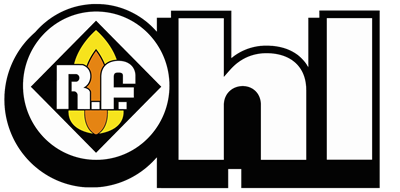
R.F. Ohl is the leading local expert for all your heating and cooling needs. We have professionally certified and trained HVAC contractors who can help you with all your home comfort issues. Our friendly techs are equipped with the knowledge and experience to resolve your HVAC problems quickly and promptly. You can count on us to give you affordable service rates in the area. All our work comes with a guarantee. Do not hesitate to call R.F. Ohl today and book a free, in-home estimate.
Click here to contact us today or give us a call at (610) 377-1098 if you have any questions.